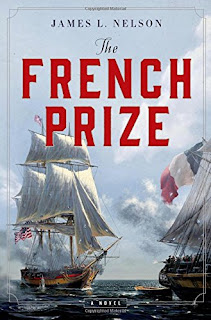By Paul Carrier
Almost 20 years ago, James L. Nelson introduced readers to sailor Isaac Biddlecomb of Rhode Island, when Nelson released the first of five novels set during the American Revolution.
The series, dubbed the Revolution at Sea Saga, highlighted Biddlecomb’s adventurous life, beginning with By Force of Arms (1997), in which the American smuggler is impressed into the Royal Navy, and concluding with All the Brave Fellows (2001), by which time Biddlecomb has become captain of a Continental Navy frigate.
Now Nelson, a prolific author of both history and historical fiction, is back with The French Prize. Isaac Biddlecomb, too, has returned, but this time as the prosperous, lionized father of Jack Biddlecomb, a tempestuous young man who has been given his first command, aboard the merchant ship Abigail.
As the novel opens, the Revolution is the stuff of history, but it remains fresh in the minds of many.
George Washington has completed his presidency, an office now held by John Adams. Party politics are blossoming as the Federalists do battle with Thomas Jefferson and his allies. France, which under King Louis XVI helped the United States secure its independence, is now in the throes of revolution, and French ships manned by “citoyens” prey on American shipping.
Even at the tender age of 19, Jack Biddlecomb is a seasoned and skilled mariner. But he is impulsive and short-tempered, and it’s clear that he still has some growing up to do. When this “bold young blade” visits a tavern with a friend before setting sail, he naively congratulates himself on his supposed maturity because, in a break with tradition, he stops drinking before he becomes “insensible.”
The Abigail and her cargo are bound for Barbados on what should be a routine voyage, but problems develop even before she sets sail. Robert Oxnard, the Abigail’s owner, has decided to arm her with six cannons, even though Jack has too small a crew to sail and fight simultaneously and his men are not trained in the use of such weaponry. Oxnard also orders Jack to provide passage to two travelers: William Wentworth, an arrogant, condescending Bostonian; and Charles Frost, Oxnard’s jocular but scheming friend.
The presence of Wentworth and Frost gives Jack pause; the former is insufferable and the latter, meddlesome. Only later, once at sea, does Jack come to realize that he may be the unwitting pawn in a dangerous game of deception and intrigue that could lead to war.
Nelson’s characters are salty and full-blooded; his plot sails at a brisk clip. The novel’s settings — Philadelphia’s docks, the unpredictable Atlantic, the privateer-infested waters of the Caribbean, and the decks of both an armed American merchantman and a French man-of-war — are sure to please any fan of nautical fiction who delights to the shout of “sail, ho!” from the masthead lookout. That’s especially true because nautical fiction usually focuses on British heroics rather than American exploits.
A glossary in The French Prize helps landlubbers separate a hawser from a headsail, and a bowline from a bowsprit. (Nelson makes heavy use of nautical terminology.) There’s also a handy drawing of the Abigail that labels her array of masts and sails. A map of the Caribbean, where much of the action takes place, orients the geographically challenged.
A healthy dash of humor provides a welcome counterpoint to the novel’s derring-do, witness Nelson’s description of the Abigail’s cook. Israel Walcott is qualified for the job because “he was willing to do it, he could boil water, he had been taught how to make a plum duff, and he was too lame to do anything else.”
Yet this is, in the end, a tale of drama on the high seas. The French Prize offers up two frighteningly brutal storms; a couple of mismatched sea battles; an aborted duel; and, later, the real thing. Looming over all is the mystery of who is pulling the strings, and to what end.
No less a light than the late, legendary Patrick O’Brian said of By Force of Arms, that first installment in the Revolution at Sea Saga, that authenticity “runs throughout the book.” The French Prize makes it clear that Nelson has not lost his touch.

